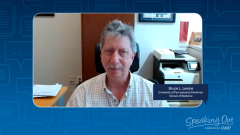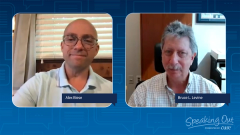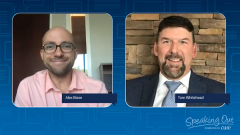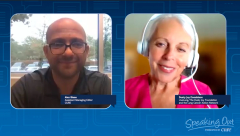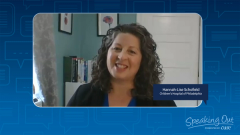
‘Incredible Advancements in Immunotherapy’ and Other Advancements in Pediatric Cancer Research
As part of its Speaking Out video series, CURE spoke with Bruce L. Levine of the University of Pennsylvania Perelman School of Medicine about advancements in treatments for pediatric cancer.
Episodes in this series

Transcription:
Alex Biese: Hi, my name is Alex Biese. I'm the assistant managing editor of CURE magazine, and in this edition of the "Speaking Out" video series on behalf of the Emily Whitehead Foundation we're speaking with Dr. Bruce Levine of the University of Pennsylvania Perelman School of Medicine, about pediatric cancer research. Dr. Levine, thank you so much for your time today.
Bruce Levine: Thank you, Alex. It's a pleasure to be with you.
Biese: What are some of the priorities and latest advances in the field of pediatric cancer research?
Levine: We're looking at some incredible advancements in immunotherapy, which is, in my background for pediatric cancers, and particularly the genetically engineered immune cell therapies or CAR-T cell therapies. We have one approval in blood cancers, we have some very promising results in some solid tumors, including some high grade gliomas and neuroblastoma. And we're looking to extend that to benefit more patients with cancer and also thinking about immunotherapy in general as a next pillar of medicine.
So, our work here at the University of Pennsylvania is focused on cellular immunotherapies. And what we're engaged in is this first generation of therapies in enhancing that by improving the potency of the cells, the specificity of cells so they're attacking cancer (and) not healthy tissues, the durability of the treatments and recognizing that this as a one-time infusion currently is a fairly expensive drug. So, how do we think about improvements to the manufacturing, improvements to the development to extend availability to more patients?
I think another part of the answer is access. And currently, these CAR-T cell therapies, the CAR-T cell therapy that is approved for children and adults, only about 20% of patients that could potentially receive do receive these therapies. And that gets to (the issue of) access in a number of ways: patient education, oncologist education, the ability to refer, geographic access, there are several hundred treatment centers in the U.S. and worldwide, but not every country and even in the U.S. there are rural areas and some more rural states where it's challenging for patients to access a treatment center. So, even being trained as an immunologist, I'm now in this position and we are as a center in the position of thinking, not only how can we innovate, but how can we deliver and how can we disseminate these therapies?
Biese: And then, in addition to the factors, including cost and access, which you mentioned, what are some of the other unmet needs or potential roadblocks right now?
Levine: Let me dive a little deeper into the approval in pediatric acute lymphoid leukemia (ALL), that's a cancer of the B cells. And on B cells, there is a very discreet target called CD19 that is very much an ideal, though not 100% ideal, target.
In solid cancers, it's very hard to find a target that is only expressed on the cancer and not expressed on healthy tissue or that target may only be expressed on a subset of cancer cells, or on a subset of cancers within a given patient population. So, what we're looking at is a combination of targets on the one hand or looking at control of the CAR-T cells so that they're only attacking the cancer and not attacking healthy tissue.
Another concern in solid cancers is it's generally much more immunosuppressive, it's more challenging from an access point of view in terms of you have a big massive tumor, so how do the immune cells get in there? So, there is work looking at all of these factors and how to engineer the cells of the therapies to address all the cancers as well as what we have now which is the equivalent blood cancers.
Biese: And in terms of trials that are currently in the works or anticipate approvals, what are some of the anticipated developments on the horizon that folks should keep an eye out for?
Levine: We had an early success in the first approval of CAR-T cell therapy and pediatric cancers, we've had subsequent approvals in adult blood cancers and a lot of activity. So, I think the challenge has been, in pediatric cancers, maintaining that momentum for patients and keeping the work going, the clinical trials going.
But what we are engaged in in adult cancers will benefit pediatric cancers in terms of those factors I was just speaking about, about looking in solid cancers to enhance potency and enhance delivery and improve the manufacturing, reduce the cost. We're engaged in some work at clinical trial in adult blood cancers where we've dramatically shortened the manufacturing and increase the potency. So, we're looking to accelerate that and ultimately to open trials in pediatric cancers. But, I think the awareness of this technology and the ability to address pediatric cancer, translational clinical research is higher than it's ever been.
Biese: That's fantastic to hear. All right, doctor, thank you so much for your time today, shedding some light on this topic. Really appreciate your time and your insight. Hope you have a great day, sir.
Levine: Thank you very much.
Transcription edited for clarity and conciseness.

